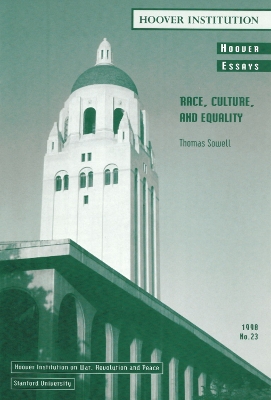In his remarks at the Commonwealth Club of California on June 18, 1998, Thomas Sowell discussed the conclusions he reached after spending fifteen years researching the economic and social impacts of cultural differences among peoples and nations around the world. This essay, Race, Culture, and Equality, distills the results found in the trilogy that was published during these years---Race and Culture (1994), Migrations and Cultures (1996), and Conquests and Cultures (1998). The most obvious and inescapable finding from these years of research is that huge disparities in income and wealth have been the rule, not the exception, in countries around the world and over centuries of human history. Real income consists of outputs and these outputs have been radically different because the inputs have been radically different from peoples with different cultures.
Geography alone creates profound differences among peoples. It is not simply that such natural wealth as oil and gold are very unequally distributed around the world. More fundamentally, people themselves are different because of different levels of access to other peoples and cultures. Isolated peoples have always lagged behind those with greater access to a wider world, whether isolation has been the result of mountains, jungles, widely scattered islands or other geographic barriers.Cities have been in the vanguard of cultural, technological and economic progress in virtually every civilization. But the geographic settings in which cities flourish are by no means equally distributed around the globe. Urbanization has been correspondingly unequally developed in different geographic regions--most prevalent among the networks of navigable waterways in Western Europe and least prevalent where such waterways are most lacking in tropical Africa. If geography is not egalitarian, neither is demography. When the median age of Jews in the United States is 20 years older than the median age of Puerto Ricans, then there is no way that these two groups could be equally represented in jobs requiring long years of experience, in retirement homes or in sports. Even if they were identical in every other way, radically different age distributions would prevent their being equal in incomes or occupations.
Discrimination is also one of the many factors operating against equality. But even if all human beings behaved like saints toward one another, the other factors would still make equality of income and wealth virtually impossible to achieve.
Neither geography nor history can be undone but we can at least avoid artificially creating cultural isolation under glittering names like "multiculturalism."
- ISBN13 9780817938628
- Publish Date 30 July 1998
- Publish Status Inactive
- Out of Print 1 November 2023
- Publish Country US
- Imprint Hoover Institution Press,U.S.
- Format Paperback
- Pages 15
- Language English
